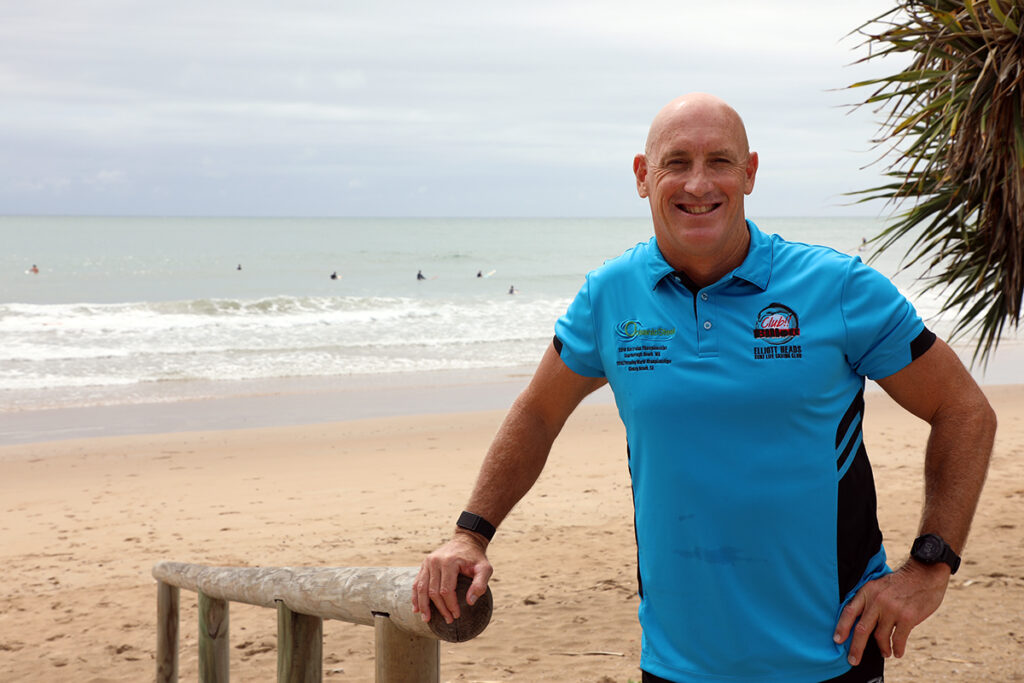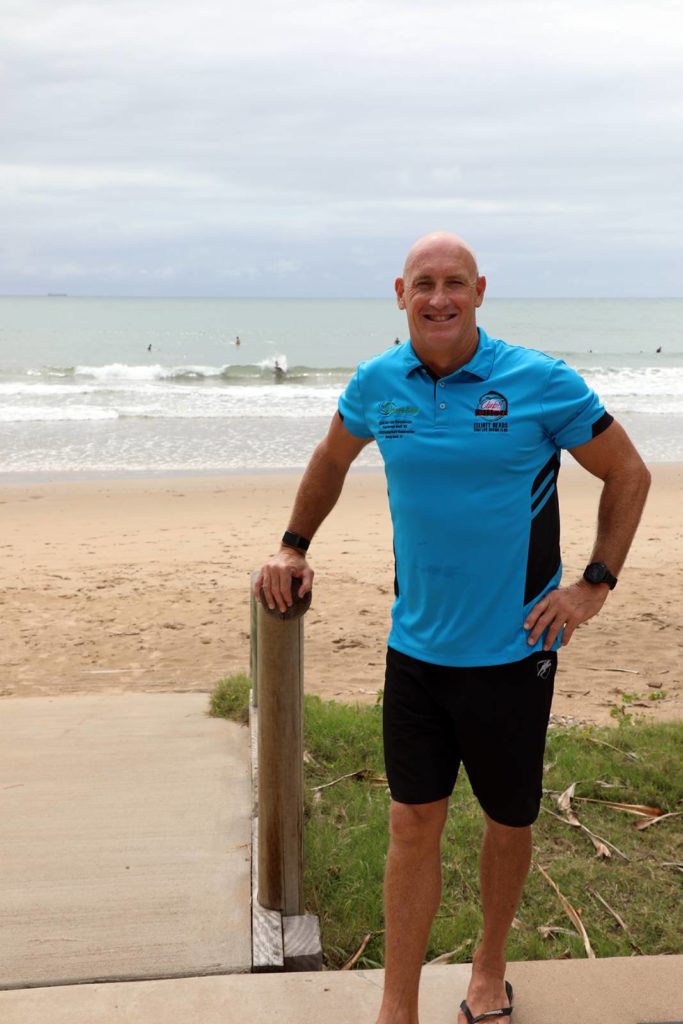
Surf lifesaving may no longer provide a living for Craig Holden, but it is certain to remain a lifestyle for the veteran of the service.
Readers may be familiar with Craig and his Bundaberg Region beach and surf reports for local media, including Bundaberg Now, but it is through his dedicated service to lifesaving, both as a volunteer and paid employee, that he has provided the greatest service to the community.
In fact, if surf lifesaving provided a different cap for every type of job done to promote its service, Craig would have an extraordinary collection to hang on his hat-rack.
Craig’s 43 years in surf lifesaving since beginning as a nipper at the age of five, included serving as Wide Bay Capricorn regional operations manager for Surf Life Saving Queensland from 1997 until January this year when he finished in the role after a restructure of the state body.
Craig said while he had loved the job he was now looking forward to the next chapter of his life.
“It’s an opportunity to see what else is out there,” Craig said.
“I was offered the opportunity to go to another role but it was Brisbane-based and I had no intention of moving to Brisbane.”
Speaking about his years on the job there is no doubt that he thoroughly enjoyed his time in the regional operations manager position – a role that changed regularly throughout the years to best meet Surf Life Saving Queensland’s needs.
“When I first started, it was primarily a lifeguard supervisor type role with a few add-ins and then gradually evolved to become more of a traditional development officer type-role, and then became a regional manager, then regional operations manager,” Craig said.
“My last role was more of a statewide role – heading up what we call our regional support departments, so all of our regional staff across Queensland were all reporting to me.”
It was a long way from his ‘jack of all trades’ beginning when he was asked to perform many tasks such as conducting skills talks, community awareness programs, staff training and coaching courses, liaising with government departments and performing media duties.
The one constant throughout all the change was his love for the job – not that Craig would describe it as a dream job.
“Surf lifesaving has been a massive part of my life,” he said.
“I’ve been (involved in life saving) since I was five years old, so getting to do something you were doing anyway, and getting paid for it, was great,” Craig said.
“I wouldn’t say it was a dream come true because I never dreamt of working for life saving, but when a role came up to work for surf lifesaving, it was a no-brainer.
Lifesaving come to the fore during 2013 flood
When asked to recall what he is most proud of during his career as regional operations manager, Craig was quick to point to the efforts of local surf lifesavers to help the Bundaberg Region community during the 2013 floods.
He said although lifesavers were not looked upon as a resource during the 2010-11 floods in Bundaberg, they were used to great effect in the Brisbane floods that same summer, prompting a call for their assistance, to which they duly responded, when flooding hit again in 2013.
“The local disaster management group really leant on us a lot and that was something I was really proud of, just to see what we, as volunteers, could do to help out.
“The floods will always stick in my mind as a big achievement for what we do at surf lifesaving.”
On a personal level, Craig said he would look back fondly on the number of lifesavers he has helped nurture from nippers to senior members and valuable members of the community.
“Whether it be coaching children or taking them on leadership camps and things like that, that’s always been an enjoyable part of my role,” he said.
“It’s always pleasing to see those kids go on and achieve their goals, just seeing them develop. And they’re the kids that come back 20 years later and still say hello.”
Craig said his parents’ heavy involvement in Elliott Heads Surf Life Saving Club and Surf Life Saving Queensland meant it had been a natural progression for, firstly he and his brother, then his wife and children to be involved.
He and his wife Kristine are life members of the Elliott Heads club, as are his late father Robert and his mother Shirley, and his brother Brett while his son Kobi, daughter Baylee, sister-in-law Rebecca and nieces Mia and Evie are also members of the club and lifesaving movement.

Craig said the friendships gained during his time in lifesaving, and the opportunity to participate in such an iconic movement, were significant factors in his lifelong devotion to the service.
“The movement allows you to provide a community service by doing your patrols and getting all your (rescue) awards and things like that, but it’s also a sport at the same time,” he said.
“I don’t think there are any other organisations that can profess to be a sport and a public safety service.
“I think it’s also just the lifestyle and the love of the beach for me.
“And I don’t know what it is, or what we do well, but it seems that people, through nippers and lifesaving, turn out to be good citizens as well.”
Craig says technological advances revolutionise lifesaving service
Craig said lifesaving had changed dramatically since he began volunteering for beach patrols as a 17-year-old, mostly due to the advances made in technology.
He said digital radio communications meant officers on patrol could now contact anyone within their region, or indeed throughout Queensland, immediately if required compared to radios operating only within line of sight for much of his career.
Craig said the provision of beach surveillance cameras, online training, and logging of statistics via electronic devices all helped deliver a faster and more effective lifesaving service, along with other advancements.
“Even things like trailers and ATVs to carry the gear down to the beach,” he said.
“We’d carry it all by hand and it’d take you 45 minutes to set the beach up because you’re going backwards and forwards carrying flags and poles and even carrying the IRB (inflatable rescue boat) on to the beach physically.
“And there were no such things as jet skis which are so easy to use. They can be used by one person rather than needing two people for the IRB.”
Craig believes the use of drones will be the next thing to revolutionise the lifesaving movement.
“We’re already using them to look for crocodiles and sharks (but maybe) they can even be used to rescue somebody or drop lifesaving equipment to somebody – it will be amazing to see,” he said.
“We won’t need lifesavers soon – just someone sitting up in the clubhouse with a remote control!”
Craig said aside from his beach and surf reports he is not employed at present but that does not mean he is not busy.
On the surf lifesaving competition front Craig is as busy as ever as a coach and competition, having not long returned from the junior state championships, with the Queensland Senior and Masters State Championships in Tugun this weekend and the Australian championships on the Sunshine Coast from April 16-24.
He is also focused on next year when, as head coach of the Australian Youth team, he is scheduled to take his charges to the world championships in Italy – although he concedes it is far from certain that the event will go ahead.
Given the busy competition calendar, Craig said he is happy to wait until the middle of the year before finding new employment but, although he has had a couple of low-key approaches about work, does not yet know what that work might be.
One thing Craig is sure of, surf lifesaving will always be a key element in his life.
“I don’t see me ever not being in the surf club, it’s part of my lifestyle now,” he said.







